
English Instructional Plan – Narrative Writing About Experiences K-1
- Subject:
- English
- Writing
- Material Type:
- Lesson Plan
- Author:
- VDOE Project Team
- Date Added:
- 04/22/2022

English Instructional Plan – Narrative Writing About Experiences K-1

English Instructional Plan - Narrative Writing: Cumulative Tales Grades 2-3
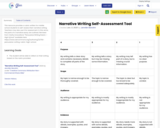
This resource provides a rubric written for middle school students to self-assess their narrative writing. Teachers may also use it for assessment. In this remix, the parts of a narrative essay are outlined.
Remixed from Clarity Innovations' "Persuasive Writing Rubric--High School" available here: https://www.oercommons.org/authoring/22756-persuasive-writing-rubric-high-school.

English Instructional Plan – Narrative Writing: Writing an Effective Conclusion Grades 4-5
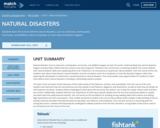
Natural disasters such as volcanoes, earthquakes, hurricanes, and wildfires happen all over the world. Understanding how natural disasters happen and why helps children feel less anxious and more prepared. Therefore, this unit focuses on teaching students the science behind each natural disaster while also explaining what to do if they live in an area prone to a particular natural disaster. Over the course of the unit, students hear about many famous natural disasters, but the unit places more of an emphasis on how the disasters happen rather than exploring the devastation or destruction caused by previous natural disasters. The unit provides many opportunities for students to learn more about recent natural disasters, including a culminating research project.
The texts in this unit were chosen because of their wide variety of text features, content, and accessibility. Over the course of the unit, students will read texts that are very technical and rely heavily on text features, diagrams, and illustrations, as well as texts that are written as informational narratives. Students will be challenged to think about the structures the authors use to help the reader interact with and learn the content. Additionally, students will learn the importance of referring to specific details from the text and using those details to explain and teach back the newly learned material. This unit serves as the foundation for building strong reading habits and routines and setting high expectations for text consumption. Clear models should be included in the unit to help students build a deeper understanding of how to actively read and annotate informational texts for key ideas, text features, and vocabulary. This unit also serves as a launching point for strong discussions. Students will frequently be challenged to debate questions from the text; therefore, strong habits of discussion need to be introduced over the course of the unit.
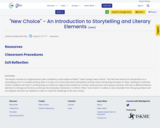
This lesson remixes an original lesson plan created by Austin Meyer entitled: "Teach Design: New Choice." This will work well as an introduction to a storytelling unit or a creative writing class. It is also a fun and interactive anticipatory activity when introducing the idea of close-reading for authorial choice. Students will work in small groups to create an original story based on a whole-class prompt. Each group, however, will have a different literary element to change as the story continues (for example, character or conflict). When "new choice" is called, a new storyteller from the group takes over and adjusts the story as needed in order to meet the challenge of the new choice.
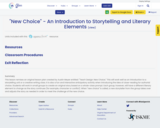
This lesson remixes an original lesson plan created by Austin Meyer entitled: "Teach Design: New Choice." This will work well as an introduction to a storytelling unit or a creative writing class. It is also a fun and interactive anticipatory activity when introducing the idea of close-reading for authorial choice. Students will work in small groups to create an original story based on a whole-class prompt. Each group, however, will have a different literary element to change as the story continues (for example, character or conflict). When "new choice" is called, a new storyteller from the group takes over and adjusts the story as needed in order to meet the challenge of the new choice.
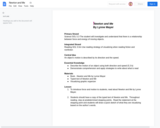
This is an introductory lesson to Science SOL 5.3 - The student will investigate and understand that there is a relationship between force and energy of moving objects.
While reading the book, students will stop at predetermined points and visualize what is happening in the book based on the author' words.

English Instructional Plan – Nonfiction Main Idea

Melinda Hodgkiss of Isle of Wight hosts a web page called Notes from the Coach. From here, access video tutorials regarding various technologies.

This lesson introduces students to the attribute of singular or plural with the focus on nouns. They will practice categorizing different nouns in both a group and individual setting. Additionally, they will learn about If/Then statements and use them to predict the rules for making nouns singular or plural.

All parts of a novel unit for Refugee by Alan Gratz
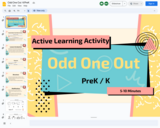
I can identify the word that does not have the same beginning sound as the other words.
I can identify the word that does not have the same ending sound as the other words.
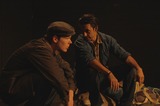
Title: Of Mice and Men Unit - Summative PBA Topic: The American Dream, Of Mice and Men (After Reading)Educational Standards: SOL 11.4Subject Area: English 11
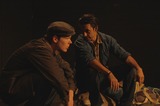
LOGISTICS - Adjust and adapt as you see fit within your classroom context (student & curricular need)Each day we engaged with the chapter through an activity/discussion during the first half of class.The second half of class (these slides), students worked independently to reflect on each chapter’s essential question, read paired passages, and draw connections between the texts.

This resource provides eight multiple-choice questions which were modeled after question stems frequently appearing on the End of Course (EOC) Reading Standards of Learning (SOL) test. It is designed to be used with the poem "One Art" by Elizabeth Bishop.
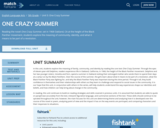
In this unit, students explore the meaning of family, community, and identity by reading the core text One Crazy Summer. Through the eyes of eleven-year-old Delphine, readers experience life in Oakland, California, in 1968, the height of the Black Panther movement. Delphine and her two younger sisters, Vonetta and Fern, spend a summer in Oakland visiting their estranged mother who sends them to spend their days at a camp run by the Black Panthers. Over the course of the summer, the girls learn about what it means to be part of a revolution, what the Black Panther Party was fighting for, and why the Black Panther Party was important during this time period. Through it all, they build confidence in themselves and their relationships with others as they learn to challenge and respond to social issues in the community. It is our hope that this unit, in conjunction with others in the series, will help students understand the way experiences shape our identities and beliefs, and how children can help bring about change in the community.
In reading, this unit continues to build on reading strategies and skills covered in previous units. It is assumed that students are able to quote or paraphrase accurately from the text, interpret figurative language, and summarize sections of the text. These skills should continue to be spiraled throughout the unit; however, the main focuses for this unit are determining theme and analyzing how it is developed over the course of the novel or poem, analyzing point of view and the impact it has on the way events are portrayed, and comparing characters and their responses to situations.

Words matter, and the words we say to ourselves matter most of all.Through a series of reflective questions, students find their "one word" of focus to encourage and inspire them in the coming months. Appropriate for the beginning of the school year, the start of a new calendar year, or anytime in between, this lesson plan includes ideas for incorporating personal goal setting with writing, digital learning integration, and a follow-up lesson integrating computer science.

English Instructional Plan: Opinion Writing: Grades 3-4
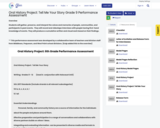
Students will gather, preserve, and interpret the voices and memories of people, communities, and participants in past events. They will record and videotape interviews with people having first-hand knowledge of events. They will produce a cumulative written and visual work based on their findings. ** This performance assessment was developed by a collaborative team of teachers and division staff from Middlesex, Poquoson, and West Point school divisions. (Kulp added this to the overview)